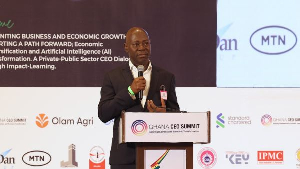 CEO and Founder of Margins ID Group, Moses Kwasi Baiden Jnr.
CEO and Founder of Margins ID Group, Moses Kwasi Baiden Jnr.
The Chief Executive Officer (CEO) and Founder of Margins ID Group, Moses Kwasi Baiden Jnr., has emphasized the need to develop a clear ethical and legal framework for the proper use of artificial intelligence (AI) in the country. He believes this framework must be created in collaboration with key international players and through building local capacity to ensure that the benefits of AI are not eroded by its threats.
He made this call while delivering a keynote address at the 8th Ghana CEO Summit, under the theme: "Transforming Ghana’s National Identity Infrastructure through Artificial Intelligence Transformation."
Mr. Baiden emphasized that while Ghana has set some strong fundamentals in its digitization agenda, which it can leverage for greater efficiency through AI, a conscious effort must be made to navigate the downsides of AI, especially the potential risks it poses to the country’s identification systems.
"We must consider the potential drawbacks of integrating AI with the Ghana Card system. One of the major concerns is the issue of data privacy," he said. "As we collect and store vast amounts of personal information, there is an increased risk of data breaches and unauthorized access."
These concerns, he noted, could be mitigated by implementing robust cybercrime laws, regulations, and defence tools, among others, to combat the risks posed by AI.
"Our preparedness for the integration of AI as a country is crucial. While the Ghana Card and our technology infrastructure demonstrate that we are ready, we must also be ready as a people. This means familiarizing ourselves with AI and becoming experts in its use, both in business and government," he emphasized.
He highlighted that integrating artificial intelligence responsibly with identification systems has the potential to significantly impact the socio-economic and political future as the 4th industrial revolution evolves.
Additionally, he mentioned that Ghana is fortunate to have overcome the challenges faced by many other countries by building robust identification systems that can be harnessed to propel the country’s digitization agenda by leveraging AI and machine learning.
"Through its continuous learning, AI can facilitate scalability and future-proofing through predictive scaling," he added. "AI can predict future demands on our National Identity System, allowing for proactive scaling of infrastructure, and ensuring that the Ghana Card remains future-proof and adaptable within a legal framework."
He noted that data generated by the National Identification system could be used by the government to plan budgets and test the assumptions underlying policies, manifestos, and other initiatives aimed at delivering services to the public, such as education, infrastructure, subsidies, and healthcare.
"With accurate data, generative AI can predict the future with remarkable speed and precision and enable leaders, such as Presidents, to make accurate decisions at the touch of a button and manage the distribution of resources."
Furthermore, the registration of babies from birth provides accurate information on the birth rate in each area, which could be used with the help of AI to construct intuitive reports.
"For instance, if 5,000 babies were born in the Techiman Municipality, in Bono East, 40% higher than usual, it means the primary schools and available infrastructure will need to be upgraded by the year 2026 to ensure that those children have adequate support in education, health, and other activities."